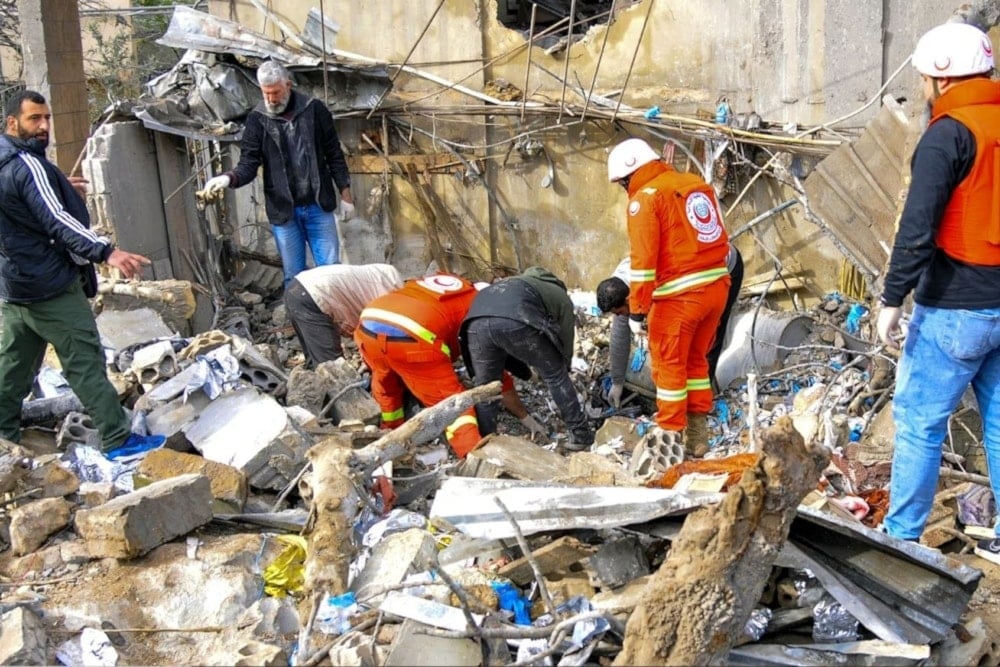'Israel' bombing South Lebanon with banned cluster bombs: Hezbollah
The Israeli strikes reportedly utilized cluster munitions, weapons prohibited under international law due to their indiscriminate nature and the severe harm they can inflict on civilians.
-

Medical workers inspect the site of the Israeli airstrike in Hebbariyeh in March. (AFP via Getty Images)
Israeli forces conducted airstrikes this morning in the area between the towns of Haneen and al-Teeri Hezbollah's Media Relations announced.
In a statement, it detailed that the attacks involved the use of cluster munitions, a type of weapon that is banned under international law due to its potential to cause widespread harm to civilians, as per the statement.
This latest attack, characterized as a "barbaric crime", marks a continuation of the Israeli offensive actions against both the Lebanese and Palestinian populations, it added.
The statement emphasized that this latest attack occurred against the backdrop of the Israeli military's clear difficulties in engaging Islamic Resistance fighters in direct confrontations.
It suggested a strategic shift in Israeli tactics, as the forces resort to aerial bombardments rather than face the Resistance groups head-on, as per the statement.
Furthermore, the statement criticized the Israeli government, emphasizing that it has been supported militarily and politically by the United States, for attacking hospitals and ambulances. It concluded by expressing concern over the apparent inaction of the international community and humanitarian organizations in addressing these violations.
What are cluster bombs and why are they banned?
The use, transfer, production, and stockpiling of cluster munitions have been banned by over 100 nations under the Convention on Cluster Munitions since 2010. Some countries did not agree to participate in the Convention and refused to sign this agreement.
The US, being one of these countries, is ignoring the fatal outcomes of these munitions as it insists on sending cluster bombs to Ukraine.
Read next: Lives scarred by cluster bombs: Untold stories of tragedy, resilience
Not an isolated incident
Human Rights Watch confirmed that the Israeli occupation used white phosphorus in its attacks on Gaza and Lebanon on October 10 and 11 of last year.
In a Q&A article about white phosphorus, Human Rights Watch expressed concerns about the Israeli occupation's use of phosphorus in military operations in Gaza and Lebanon, highlighting the serious and long-term risks it poses to civilians.
Human Rights Watch substantiated these claims with video evidence from Lebanon and Gaza, which depicted multiple airbursts of artillery-fired white phosphorus over the Gaza City port and two rural locations along the occupied Palestine-Lebanon border.
White phosphorus, with its dual capability for marking, signaling, and obscuring or as an incendiary weapon, can cause severe burns to individuals and ignite structures, fields, and other civilian objects in the vicinity.
The use of white phosphorus in Gaza, one of the most densely populated areas globally, significantly heightens the danger to civilians and constitutes a breach of international humanitarian law's prohibition on needlessly endangering civilians.
International law explicitly forbids the use of phosphorus, and such actions are considered violations by the occupying forces. It's worth noting that assaults employing air-delivered incendiary weapons in civilian areas are outlawed under Protocol III of the Convention on Conventional Weapons (CCW).
Lama Fakih, Director of the Middle East and North Africa division at Human Rights Watch, emphasized, "Whenever white phosphorus is employed in densely populated civilian zones, it presents a grave risk of agonizing burns and enduring suffering."
She further explained, "White phosphorus is inherently indiscriminate when airburst in densely populated urban regions, as it can ignite buildings and cause severe harm to civilians."
Chemical properties
White phosphorus is a combustible (ignites when exposed to oxygen) and a severely fatal chemical. The combustible reaction produces light, heavy white smoke, and heat of about 815°C.
White phosphorus is highly soluble in human flesh and causes deadly thermal and chemical burns that can go as deep as the bones.
Direct contact is extremely excruciating and can leave long-lasting damage to internal organs. Even inhaling its vapor can cause severe inflammation in the trachea.
Under International Law
The use of white phosphorus bombs, which fall under the category of incendiary weapons in international law, is governed by Article 2 Protocol III of the 1980 Convention on Certain Conventional Weapons (to which "Israel" is a signatory).
Article 2.1 reads that the use of white phosphorus bombs against civilians and civilian objects is absolutely prohibited.
Furthermore, Article 2.2 specifies that even targeting any military objective located within a concentration of civilians by airstrikes is also categorically prohibited.
Israeli precedents in employing phosphorus
The Israeli occupation forces had long used various internationally prohibited weapons against civilians in violation of international humanitarian law.
Israeli occupation forces employed white phosphorus bombs in 2006 against Lebanese civilians, in 2008-2009 against Palestinian civilians in Gaza, and again in 2014 against civilians in Gaza.
In all three wars, "Israel" claimed to use phosphorus bombs for illumination purposes.

 5 Min Read
5 Min Read









